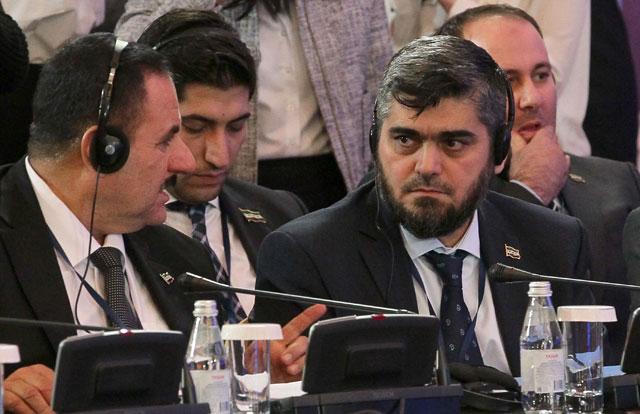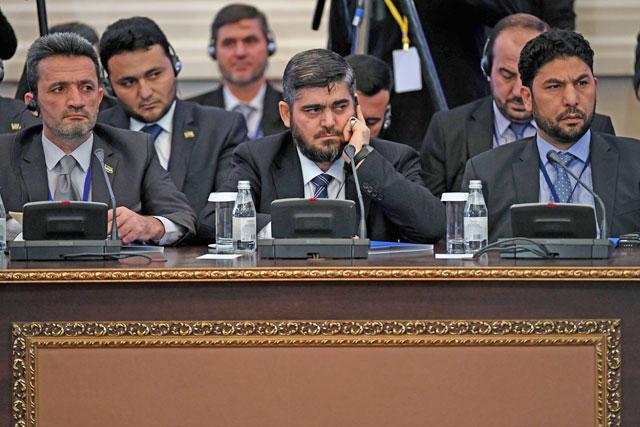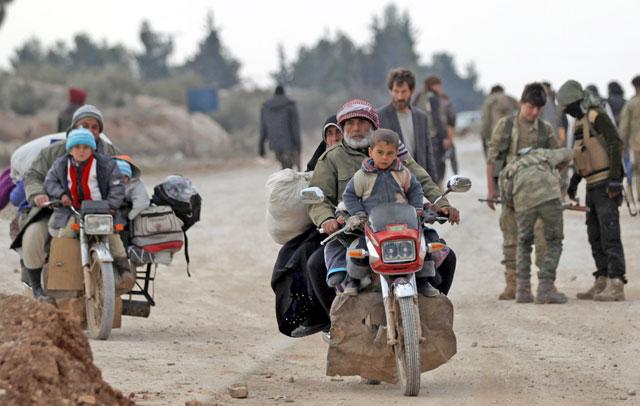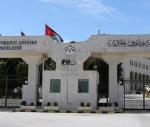You are here
Russia slams US for snubbing Syria peace talks in Astana
By AFP - May 14,2018 - Last updated at May 14,2018
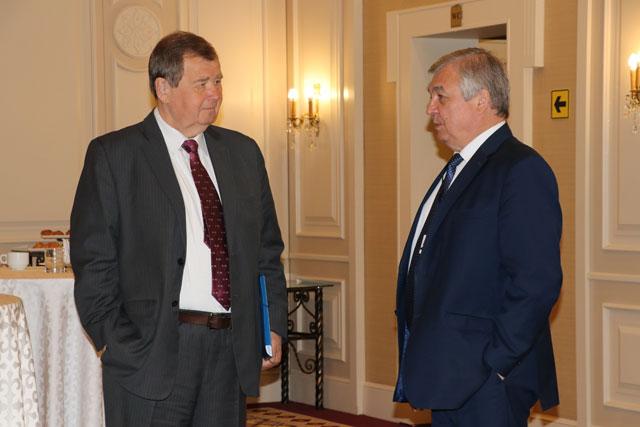
Russian president’s special envoy on Syria Alexander Lavrentiev (right) attends the 9th round of Astana talks on Syria on Monday in Astana, Kazakhstan (Anadolu Agency photo)
ASTANA, Kazakhstan — Russian chief negotiator Alexander Lavrentyev on Monday upbraided the United States for not sending a delegation to observe the latest round of Syria peace talks in Kazakhstan.
Negotiators from Iran, Russia and Turkey gathered in the Kazakh capital Astana on Monday hoping to make progress on a political settlement in Syria as tensions fan out across the region.
Briefing journalists after the first day of the talks spearheaded by Moscow, Lavrentyev criticised Washington’s decision not to send observers after its delegations came to eight previous rounds of negotiations in Astana.
“This time round the Americans, unfortunately, have decided not to support our international efforts,” Lavrentyev said.
“We regret this and believe the path to political settlement can only be found at the negotiating table, not in efforts and scenarios worked out behind the back of the Syrian government and the international community,” he said, without elaborating.
The two-day talks are the first time the three foreign powers most deeply involved in Syria’s seven-year war have met together since Iran and Israel became embroiled in a spat over reported cross-border military strikes last week.
It is also the first meeting of the three sides since US President Donald Trump announced Washington’s withdrawal from the Iran nuclear deal earlier this month in a move further complicating the regional picture.
A Syrian rebel delegation was expected to arrive late on Monday ahead of Tuesday’s plenary session, according to Kazakhstan’s foreign ministry.
The United Nations envoy on Syria Staffan de Mistura was also present at the talks.
Iran-Russia
‘excellent cooperation’
The multisided conflict that has killed more than 350,000 people took a new turn last week after Israel and Iran became embroiled in a dispute over reported cross-border strikes.
Israel claims it struck dozens of Iranian targets inside Syria on Thursday in response to a salvo of rockets fired by Iranian forces into the occupied Golan Heights.
Iranian Foreign Minister Mohammad Javad Zarif and Russian counterpart Sergei Lavrov held talks in Moscow on Monday.
Zarif said he was “seeking assurances” from the backers of the country’s nuclear deal after the United States pulled out earlier this month triggering broad international condemnation and fresh fears for the region.
After the talks, Zarif praised the “excellent cooperation” between Moscow and Tehran and said Lavrov had promised him to “defend and keep the agreement” in comments reported by the Iranian ISNA news agency.
Iran’s top diplomat had already visited Beijing and was later heading to Brussels as part of Tehran’s bid to salvage the deal.
Since negotiations on Syria in Astana began at the beginning of last year, they have mostly focused on attempts to keep Syrian regime forces and their rebel opponents at arm’s length.
But any limited achievements in reducing government-rebel hostilities were put into reverse gear in February when regime forces allied with Moscow and Tehran began a devastating assault on Eastern Ghouta, a suburb of Damascus that was under rebel control at the time.
On Friday, Syrian state media and The Syrian Observatory for Human Rights war monitor both said that the last rebel groups had exited towns close to the capital.
Their departure means that militants from the Daesh group fighting on the outskirts of Damascus are now the main challenge to government control over the capital and its surrounding area.
Related Articles
ASTANA, Kazakhstan — Syrian regime and rebel representatives failed Thursday to make any breakthroughs at talks in Kazakhstan, as key powerb
ASTANA — Syria’s warring sides met for talks for the first time in nine months on Monday, with frosty initial exchanges suggesting chances o
MOSCOW — Russia said on Sunday that it supports the continuation of Syria peace talks under United Nations auspices, long-running negotiatio


